┬а┬а┬а┬а┬аThe theme of this yearтАЩs FIATA
World Congress in Panama is: The Great Connection.
┬а┬а┬а┬а┬аI
admit I have seldom heard a more appropriate, imaginative and yet concise
motto for a FIATA event, and I have seen many of these slogans in my many
years with FIATA. Connection is indeed the guiding principle in our work.
What are forwarders doing in the end? Scout, establish and exploit each
and every connecting opportunity that exists in the international trade,
be it human, mechanical, digital, geographical or in any other form or manner.
We are indeed тАЬconnectingтАЭ people with their goods, wherever
they come from. Perhaps this could be another way of looking at freight
forwarding services . . . 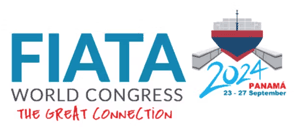 ┬а┬а┬а┬а┬аWhen
┬а┬а┬а┬а┬аWhen
I started my work at CLECAT in 2003, both FIATA and CLECAT were having a
conversation on a possible definition for the freight forwarding services,
which was strongly demanded by the institutions we were working with. There
was a principal opposition to the idea of тАЬdefinitionтАЭ from
our lawyers, who were reluctant to use the term. In the end the solution
came from one of our most revered members, who said: we shall not use the
term definition, but we can surely describe what we are doing! 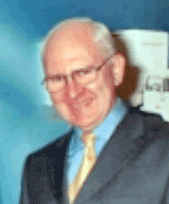 This
This
is the skilful тАЬdescriptionтАЭ of freight forwarding services
that was invented in 2004 by Colin Beaumont (left) of BIFA and
still works perfectly today: “Freight forwarding and logistic services”
are services of any kind relating to the carriage (performed by single mode
or multimodal transport means), consolidation, storage, handling, packing
or distribution of goods, as well as ancillary and advisory services in
connection therewith, including but not limited to customs and fiscal matters,
declaring the goods for official purposes, procuring insurance of the goods
and collecting or procuring payment or documents relating to the goods.
Freight forwarding services also include logistic services with modern information
and communication technology in connection with the carriage, handling or
storage of the goods, and de facto total supply chain management. These
services can be tailored to meet the flexible application of the services
provided.
┬а┬а┬а┬а┬аThis description is part of
the statement still appearing on FIATAтАЩs website, where you normally
find materials produced only in the last few years, despite FIATAтАЩs
history dating back 98 years. FIATA was indeed founded in Vienna, AT on
31st of May 1926 and held its knowledge flame high and alive for almost
a century now. From FIATAтАЩs Congress organisers LinkedIn post you
read that тАЬthe FIATA World Congress brings together logistics and
freight forwarding professionals from around the globe to discuss current
trends, challenges, and innovations in the industry. It serves as a vital
platform for networking, knowledge sharing, and fostering collaborations
among key stakeholders in the global logistics sector.тАЭ This has not
changed much through the years I daresay.
┬а┬а┬а┬а┬аToday,
on September 23rd 2024 I am sitting in my study in Turin and I am listening
to SRF2 on the internet, as sort of celebration. SRF2 was the Swiss radio
playing classical music in Zurich in my FIATA years, and it played in my
office until I retired seven years ago. My 1980 Grundig portable stereo
(with detachable loudspeakers) poured endless music and inflexible German
accents onto the 5th floor of Schaffhauserstr. 104, Glattbrugg, CH since
December 2011. Form Turin to Trieste, then to Brussels and Zurich and eventually
back to Turin the little plastic wonder still plays beautifully today forty
years after: in Turin it played RAI Radio3, in Brussels Musiq3 and in Zurich
SRF2. Classical music helps my work, it always has.
┬а┬а┬а┬а┬аPrecisely
on the same day, in Geneva, IATA and FIATA release a PR announcing тАЬFIATAтАЩs
endorsement of the IATA Cargo Handling Manual (ICHM). This follows an extensive
one-year process of discussions, review and collaboration between the two
organisations. The ICHM provides standardised procedures for airlines, ground
handling agents (GHAs), and freight forwarders, ensuring consistency and
efficiency throughout the cargo process. By adopting these standards, freight
forwarders, airlines and GHAs will better align their operations, by leveraging
their respective expertise in order to improve efficiency across the supply
chain.тАЭ There is a bit more to read that tells you about the approach
the association is taking now: “FIATA has worked closely with IATA
in 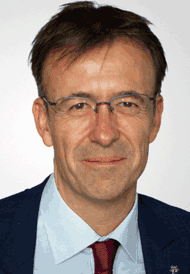 reviewing
reviewing
the ICHM, providing valuable input to ensure that it addresses the specific
needs of freight forwarders of all sizes around the world, including the
SMEs. The result is a set of standardised procedures that will enable faster,
more efficient processes, while also improving service to shippers. Crucially,
FIATA prioritises safety and security, and this collaboration ensures that
these key aspects are embedded throughout the handling procedures. This
strengthens mutual recognition across stakeholders, driving operational
efficiency, safety, and cost savings throughout the supply chain,тАЭ
said St├йphane Graber, (right) FIATA Director General. The
PR concludes that тАЬFIATAтАЩs endorsement of the ICHM aligns all
major players in the air cargo handling process around a single, consistent
set of global standards. It signals a new era of cooperation between freight
forwarders and airlines, underpinned by a shared commitment to operational
excellence.тАЭ
┬а┬а┬а┬а┬аI am not sure that
all those who collaborated with the Air Freight Institute of FIATA for so
many years would share this content word for word, but fact is that the
two entities are back on the track of dialogue. Whether this evolves into
a peer-to-peer conversation, as was desired for decades now, will be the
subject of our subsequent studies. тАЬGerne werde ich mich ├╝berraschen
lassenтАЭ (I shall be pleased to be surprised), as a good friend said
when I asked him what he thought about this new development. 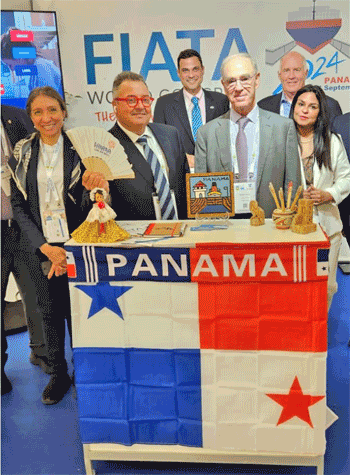 ┬а┬а┬а┬а┬аCongress
┬а┬а┬а┬а┬аCongress
participants will come in from all corners of the earth as usual, the USA
will probably take advantage of the proximity with Panama and we know already
that тАЬBoard members of The
Airforwarders Association are viewing the Panama Canal Zone and the
city today, learning about this region’s economic importance to our industry
and the world. We look forward to a Director’s meeting on Monday, followed
by many of us attending the FIATA World Congress 2024 this week.тАЭ
This is what we read today from our friend Brandon FriedтАЩs post on
LinkedIn.
┬а┬а┬а┬а When serving as DG I would have
arrived in Panama several days in advance and I guess St├йphane has
been there in advance, as busy as one could imagine. So my best wishes to
you, St├йphane for one more successful conference! As usual the programme
is an exercise where diplomacy and sequence seem to sit on either side of
the fence. This is indeed the most complicated thing to do when you organise
the FIATA WC. Everything is important, the food, the entertainment, the
networking opportunities, the hosting countryтАЩs flair, the Young Freight
Forwarders Award, the technical meetings, the Board and Presidency meetings,
etc. but the composition of the contents programme is quite a feat. Again,
as I said on other occasions, it is a question of balance between the international
nature of FIATA, the legitimate interests of the local organisers, the paramount
requirements of the sponsors and supporters, who are all entitled to a bigger
or smaller slice of the enormous interests the FIATA WC affords. All this
must be mirrored in the mood of the times and trends that populate our agendas.
It is a question of balance between interests, topics, personalities, abilities
and a bit or supernatural intuition. For those who believe in the Zodiac,
this congress opens its doors in the first decade of Libra, so it is bound
to be balanced and distinguished.
┬а┬а┬а┬а┬аOn
Wednesday, 25th of September, the first Plenary presents the тАЬView
from the top: Emerging trends and forces shaping logisticsтАЭ and we
shall hear that тАЬLogistics and trade are in a state of constant evolution,
driven by shifting consumer demands, rapid digitalisation, and an ever-changing
geopolitical landscape. In this dynamic environment, the role of logistics
service providers becomes increasingly critical as engaged and active partners
to customers. The session will gather high-level global actors to explore
perspectives on the future of global trade and transportation, setting the
stage for more in-depth discussions in subsequent panels. Attendees will
gain insights into the current trends shaping the market, how the logistics
sector is adapting to new realities and what strategies are being implemented
to foster innovation and sustainability.тАЭ
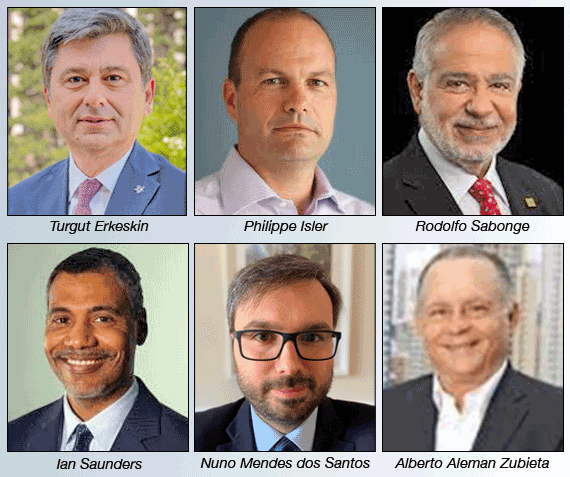
┬а┬а┬а┬а One could argue that this is only relatively
new, but then again the speakers
are making the difference: Turgut Erkeskin, FIATA President; Philippe Isler,
Director, Global Alliance for Trade Facilitation and Executive Committee
Member, World Economic Forum; Rodolfo Sabonge, Secretary General, Association
of Caribbean States; Ian Saunders, Secretary General, World Customs Organisation;
Alberto Aleman Zubieta, Advisor to Panama Government will debate these popular
issues and my hope is that some new insights will emerge, considering we
are looking at these topics from an area where FIATA travels less frequently
than usual: the Americas. Moderated by Michele Labrut, Americas Correspondent,
Seatrade Maritime News, ├зa va sans direтАж this debate will be
one to follow. On the very same day there will be an тАЬexclusive presentation
of the B-READY report on Trade, the World Bank’s flagship report benchmarking
business environments and investment climates worldwide, presented by Nuno
Mendes dos Santos, Private Sector Development Specialist, World Bank.тАЭ
If the World Bank speaks, guess what? We listen.
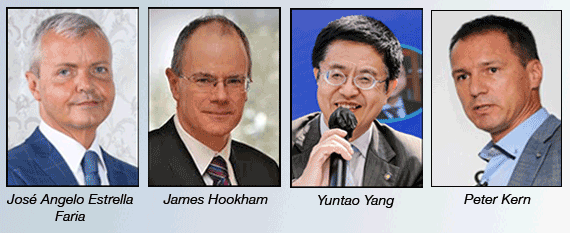
┬а┬а┬а┬а┬атАЬFrom Paper to PixelsтАЭ is
the captivating title of the 4th Panel which will take place on the following
Thursday in the morning. This panel will feature a conversation among the
most knowledgeable speakers in this area: James Hookham, Secretary General,
Global Shippers Forum; Peter Kern, Vice President Commercial, CargoX; and
Yuntao Yang, General Counsel, Sinotrans, whose personal friendship is a
reason of pride and honour for me. The panel will be moderated by Jos├й
Angelo Estrella Faria, Principal Legal Officer, United Nations Commission
on International Trade Law (UNCITRAL) with the following declared intention:
тАЬThe role of freight forwarders has evolved from being purely an intermediary,
to being architects of transport and logistics services acting as contractual
carriers, assuming responsibility as principal for the entire goods transportation.
The United Nations Commission on International Trade Law (UNCITRAL) has
embarked on a pivotal project aimed at creating an international legal framework
to support тАШnegotiable cargo documentsтАЩ, which could perform
an analogous function as a maritime bill of lading for the carriage of goods
in a multimodal or unimodal context. The project holds significant promise
for freight forwarders as it will support and encourage the issuance of
multimodal bills of lading (both paper and electronic versions). This session
will explore industry needs for multimodal transport documents and the exciting
opportunities that can be brought by this project for greater supply chain
resilience.тАЭ
┬а┬а┬а┬а┬аThose of you who have
read these pages in the past know that the path of digitization in logistics
is long: it kept developing (or not?) over the years like a Echternach
procession. In the end the universal digitization that we had hoped
for at the end of last century has yet to take place, but things are moving
forward and FIATA gave its substantial contribution to the process, participating
at all levels of discussion for years. Fact is that the adoption of the
MLTER
has given the process some additional energy now and the end of the tunnel
seems to get closer. From my point of view this debate is a must-see for
all those who are interested in the future of our sector.

┬а┬а┬а┬а┬аThis yearтАЩs Congress boasts even
a visit to the Biodiversity
Museum, which is part of the entertainment package every attendee is
entitled to enjoy. This is where the cultural night reception will take
place. As tradition imposes there will be plenty of other meeting opportunities
for all, such as the Welcome Cocktail and the Gala Dinner held at the Casa
Veranda of the Grand Sheraton.
┬а┬а┬а┬а┬аOne item
that seems to have been handled with particular success by the organisers
is the presence of partners, sponsors and exhibitors. If you peruse the
page
which lists their participation you will surely find some of the names that
you are accustomed to deal with day in and day out. Within the many others
тАУ all worth mentioning several times тАУ I think I need to pay
a special tribute to the TTClub for its unconditional support of the FIATA
Young Freight ForwarderтАЩs programme and award, and to Avalon. Both
entities provide insurance services and both have accompanied FIATA for
so many years I cannot even remember when it all started. I know that all
contributors are important, but these two guys have been there consistently
for time immemorial. Credit to both, with thanks.
┬а┬а┬а┬а┬аI
was not able to fly to Panama this time. This is unfortunate, but it is
a fact of life. There is, fortunately, no reason to worry in terms of my
personal health. This being said, I will be following the Congress from
Italy and thanks to todayтАЩs technical means there are lots of ways
to interact with my friends in FIATA. It would seem quite odd then that
I urge you to fly out to Panama and join in the Congress, not having done
so myself, but I do indeed! Please do join FIATA in Panama. The industry
needs you, Panama needs you and all your friends in FIATA will want to see
you there. It is the perfect opportunity to meet all your interests assembled
in one place. And it will be fun, too. It has always been so and I am sure
Panama will add an extra spice to the enjoyment.
┬а┬а┬а┬а┬аRemember
that almost all FIATA Congress participants arrive tired from a long journey,
often stressed by their tight schedules and their work chores. At times
you can see in their faces the signs of pressure. Yet, through sleepless
nights, long meetings, complex deliberations and the concentrated emotions
they all leave at the end with a clear, happy face and the departing friends
making promises to meet again soon, and this happens each and every year
in a different location in a different country in a different continent.
ThatтАЩs FIATA!
┬а┬а┬а┬а┬аOne of the PCOтАЩs
I talked with many years ago said to me (I was then FIATAтАЩs DG): тАЬAre
you trying to tell me that we need to organise a 1000-pax conference with
a different theme, a different organising team, in a different country,
in a different continent every year? But, excuse me, thatтАЩs impossible!тАЭ
┬а┬а┬а┬а┬аI replied: тАЬYes, I know, you are
probably right, but FIATA does it every year, and has been doing it for
decades, so you should be thinking about itтАжтАЭ That is the magic
with FIATA. If I cannot be there in person this time, I shall be there with
my soul.
┬а┬а┬а┬а┬аBest wishes to my FIATA friends,
the organisation, its Members, and all those who make this possible, the
President, the Board, the Secretariat with its Director and everyone else.
Best wishes to you all! Looking forward to seeing you all in Geneva next
Spring.
Marco Sorgetti
Source link : http://www.bing.com/news/apiclick.aspx?ref=FexRss&aid=&tid=670708d133e54ba1bc28200621b49e33&url=http%3A%2F%2Fwww.aircargonews.com%2F2024%2F0924%2F092424%2FFIATA-At-Panama-Crossing.html&c=8502717435269813443&mkt=en-us
Author :
Publish date : 2024-09-23 13:00:00
Copyright for syndicated content belongs to the linked Source.












